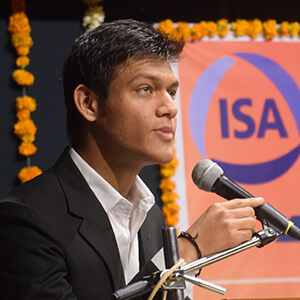Vishal Gyanchandani
International student, Alumnus
- Subject area
- Mechanical, Electrical and Manufacturing Engineering
I chose to study Electronic and Electrical Engineering at Loughborough University because the modules involved in my master’s were diverse and opened me up to a range of fields in which I could pursue a career. Also, modules like Communication Networks, and Sensors and Actuators for Control, belonged to a field in which I was really interested and wanted to gain expertise. Moreover, Loughborough University is a top-rated university and is known to have excellent academics and research facilities, which was a natural attraction for me as I always wanted to learn from, and be part of, some of the exciting and challenging breakthrough research programmes going on at the University.
Teaching excellence throughout Covid
The teaching quality and facilities were excellent, especially in these times of Covid-19 and, even though the course was conducted remotely, the lecturers were able to deliver course contents nicely with help of software platforms such as Microsoft Teams. The practical experiments, which used to happen in person, were shifted to the remote experiments using platforms like Matlab and Wireshark, which gave me hands-on experience of softwares which are currently being used in industry, where demand for such software skills is quite significant right now. Moreover, group exercises in some modules were helpful in terms of personal development, confidence building and improving communication skills.
A robust support network
The academic language support department conducts regular seminars which I also found helpful in terms of improving my technical writing skills. The Pilkington Library had some excellent resources related to my programme, which helped me gain in-depth technical knowledge in my field.
The support I received from my department and the University benefitted me a lot. When I was conducting my research, the technicians in the electronics workshop in the Wolfson School supported me greatly in terms of providing me with measuring instruments, cables and other items needed in order to conduct my project. When I needed to modify my PCB for the project, they also helped me with it and delivered my modified PCB as per the required specifications.
I met with my project supervisor, Dr Hailing Fu weekly for meetings and he guided me throughout my project by asking me some interesting questions and giving me some ideas which were quite fruitful in order to achieve the desired project objectives. The University awarded me with a £5,000 scholarship towards my tuition fees and also helped me during Covid-19 with a one-off £500 grant to help me cover my personal expenses. Also, the University’s careers advisory service arranged some superb group exercise sessions and individual mock interviews, which helped me with my applications in industrial graduate schemes. As a result, I was successful in securing a role as an Electrical Controls Engineer.
Building a foundation for my career
My career ambition is to become an engineering professional with excellent technical knowledge in control systems background and gain Chartered Engineer status in the future with a well-recognised institution. Loughborough University has helped me with taking baby steps in a world of advanced control systems and machine learning applications with modules like Digital Signal Processing, Sensors and Actuators for Control, Communication Networks, Advanced Electronic Engineering Applications, Radio Frequency and Microwave Integrated Circuits, and Mobile Network Technologies. Moreover, my master’s degree has greatly helped me in building a strong professional profile and I have fulfilled some statutory requirements in order to gain Chartered Engineer status in the future.
My research project was to design a self-powered wearable device for human health monitoring applications. Under the guidance of Dr Hailing Fu, I designed and developed the prototype of a wearable device that monitors human cardiac activity by measuring heart rate and oxygen saturation, tracking the user’s activity of daily living, such as walking, running, resting and most importantly, detecting dangerous human fall. The prototype was completely self-powered using photovoltaic panels which is an innovative solution for long term healthcare monitoring applications, without needing to charge the device at regular intervals and achieve sustainable operation.
I got 86% in my project and I gave a presentation of my research paper at the PowerMEMS 2021 conference. My greatest achievement during my time at Loughborough was that my paper was published in IEEE explore digest at the end of 2021.
Inspired to be the best
Loughborough has inspired me to become the best in my field and keep on contributing towards creating a more sustainable world, by finding innovative solutions to challenging problems like climate change, global warming and disastrous pandemics.
Also, the Loughborough athletics community did significantly well by winning medals on the Olympics stage. They inspire me further to give my best in whatever work I am doing and try to become better each day by upgrading my skills, techniques and knowledge.
*Please note that we are no longer accepting applications for the MSc Electronic and Electrical Engineering. We offer a number of related degrees within the School of Mechanical, Electrical and Manufacturing.
